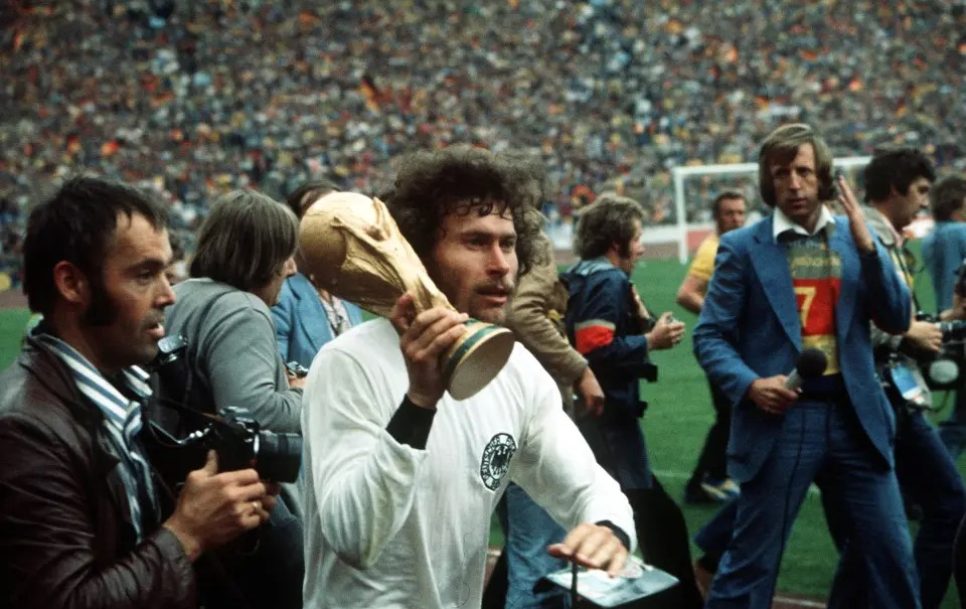When defenders score: Germany’s well-oiled machine named Paul
Ronaldo dribbles, runs, and scores! Messi did it again! Neymar – the winning goal! We have all heard those cries on football pitches: the star striker saves the day yet once again. But in reality, there are still ten men on the field, and as the saying goes – attack wins you games, defense wins you titles.
To correct the injustice of the (football) world, we invite you to a ten-part series with Olybet.TV, where we talk about defenders. But to make things a little more appetizing, let’s talk about the most productive defensemen in football history.
The hero of our opening story, James Tavernier, who scored over 100 goals for Glasgow Rangers, continues to do things on the pitch, and the main character of our second story needed no introduction – everyone knows Roberto Carlos! However, in the third installment of our series, a bit of time travel is in order. Ladies and gentlemen, meet Paul Breitner.
Paul Breitner – 113 goals
For serious football fans, the 72-year-old German needs no introduction, as he was considered one of the best players of his time – that is, the 1970s.
As the small town of Kolbermoor in Bavaria quickly became too small for the talented player, he learned the essential basics of football in Freilassig. At the age of 18, Breitner had already reached the ranks of Bayern Munich, where he performed the duties of left-back.
However, Breitner cannot be said to be an exactly loyal defenseman: although things were always in order at the back, he loved going on “journeys”. Fortunately, the head coaches at that time were not against it, and the fans could see from time to time, how during the game, the “left-back” Breitner could be found in the place of the right winger.
Due to his creative and determined play, he was swiftly invited to the German national team, where he formed an invincible backline with Franz Beckenbauer and Berti Vogels.
In 1972, the trio became European and two years later world champions with Germany. And it was Breitner, who scored the penalty earned in the opening half against the Netherlands, in the 1974 World Cup final, which resulted in a 2:1 victory.
Farewell Germany. Hello Spain!
However, after the successful WC, Breitner decided to leave his homeland. He moved to play for Real Madrid and withdrew from representing the national team. Breitner spent a total of three seasons in Spain, where he snatched two championships. The significant fact is, that it was in Madrid that the German was moved from left defense to midfield.
When he returned to his homeland in 1977, Breitner was already a purebred midfielder – let’s keep a blind eye in the interest of a good story here – and began to score more quickly. If in the first seven years of his career, he scored a total of 27 (league) goals – certainly a decent number – then in the next six years he hit as many as 66.
In his second spell at Bayern, Breitner’s star truly shone: he led the club to several consecutive championships, became the team’s captain and aced in the midfield with Karl-Heinz Rummenigge. Their dynamic association was affectionately called „Breitnigge“.
The second World Cup final and a painful end
In 1981, Breitner returned to the German national team, at the behest of then head coach Jupp Derwall, and helped the Germans to the World Cup final again the following summer.
Although the Germans had to settle for a silver medal against Italy, Breitner still managed to score 1:3 in the losing game.
Thus, he became only the third player after Pele and Vava to score in two World Cup finals. Later, Zinedine Zidane and Kylian Mbappe have also joined this exclusive group.
But this is not the only exclusive group to which Breitner belongs. In 2004, FIFA named him among the 125 best football players.
Breitner might have been able to add to his five German championships, two WC victories and one European Cup victory, if not at the age of 32 Hamburg player Wolfgang Rolff hadn’t put a terrible end to Breitner’s career, seriously injuring the legendary player.
There is a painful question mark regarding his possible could-have-been future, especially considering the fact that in the 1981 Ballon d’Or election, only his midfield partner Karl-Heinz Rummenigge was ahead of Breitner.







